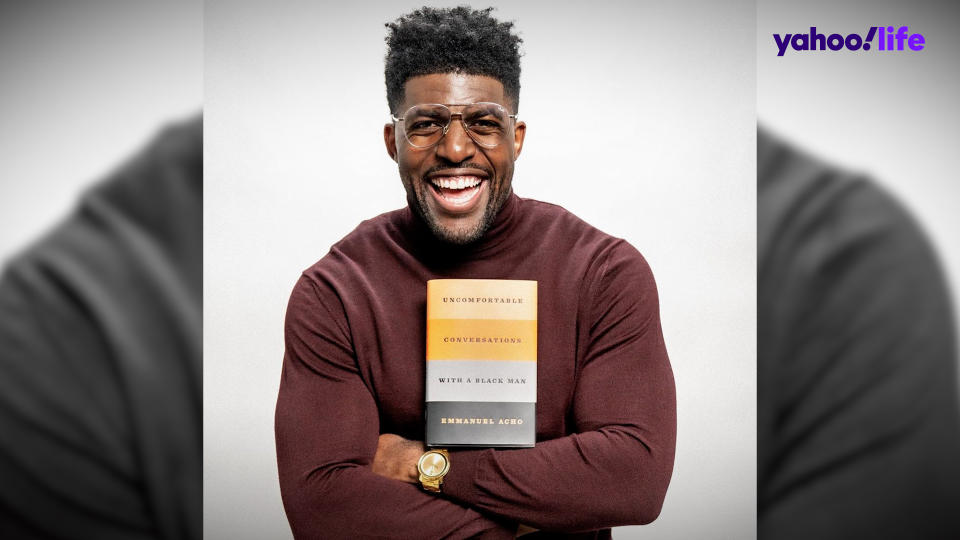'Uncomfortable Conversations With a Black Man' host Emmanuel Acho tackles racism in new book
Conversations erupted all over America this summer after the death of George Floyd. Issues of racism, police brutality and unconscious bias became mainstream topics, creating tensions in families and among friends. In June, former NFL player Emmanuel Acho’s video series, Uncomfortable Conversations With a Black Man, emerged as a space for open and honest dialogue about race. That video series has now been turned into a book by the same name.
The journey from the video series to hardcover started with a call from Oprah Winfrey — whose imprint published Acho’s book. “I'm talking to Oprah and then we talk on FaceTime and she says, ‘Emmanuel, what is your intention?’ And I said, ‘Well, my intention is to bridge the gap towards racial reconciliation,’” Acho tells Yahoo Life.

Raised in Dallas in a Nigerian household, Acho credits his ability to get “uncomfortable” on the topic of race with his upbringing.
“I am fluent in white culture and fluent in Black culture,” Acho says. “Because of my immersion in culture that was white and Black, I understand that there is a language disconnect, so I just try to stand there and almost act as a translator or facilitator.”
That ability to bridge the divide has led to conversations with actor Matthew McConaughey, NFL commissioner Roger Goodell and the entire police department from Petaluma, Calif. Acho hopes that seeing high-profile guests ask uneasy questions will help readers (and viewers) to get out of their comfort zones.
“If Matthew McConaughey, who has very little to gain and everything to lose, can sit down with a Black man and ask some questions that could be deemed ignorant, then you my white brother and sister, you have no excuse,” Acho says.
Topics discussed in the book range from white privilege and white fragility to cultural appropriation and systemic racism. Acho even explains transracial adoption, a topic he explored on his video series, where he pushed the comfort level by asking a Black child with white adoptive parents if she wished her parents were Black.

“It was like, your answer will lead to tears either way, either way somebody is going to start crying,” Acho explains. “And she said, ‘No, I just want them to love me for me.’”
A few may feel uneasy with some of the questions in the book, but that’s the point. Acho believes that progress can happen when people don’t have to stay so politically correct.
“I need you to grasp the concept that there is a systemic fracture in our society and you can’t fix a problem you don’t know exists. I’m letting you know it exists. Let’s all please work to fix it,” says Acho.
During this period in America, where conversations of race and identity remain central, some Black people may feel emotionally burdened with explaining the intricacies of race in America to white peers. This book serves as a resource, with explainers, book recommendations and podcast suggestions in the back.
Acho recognizes the emotional labor of engaging in these conversations, but his passion to unite continues to fuels him.
“I don't have time for fatigue, like change has to happen. It’s not going to be for a lack of me speaking that white people don’t hear,” says Acho.
Video Produced by Stacy Jackman
Read more from Yahoo:
Want lifestyle and wellness news delivered to your inbox? Sign up here for Yahoo Life’s newsletter.

